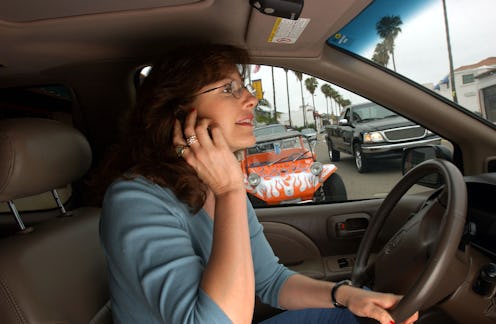Life
A Study Just Found Driving & Talking On The Phone Is Even MORE Dangerous Than You Thought

Texting while driving is illegal in almost every state, and most of us have heard PSAs about why it's an awful idea to text while driving. But what about answering a phone call? According to a new study from researchers at the University of Calgary, talking on your phone while driving can be more dangerous than we think. "After decades of research and policy activity, talking on a cell phone while driving continues to be a common behavior identified as a contributor to crashes," the study starts out. From there, the findings are even more grim. The research team analyzed nearly 100 studies about driving and cell phone use, and they found that talking on a phone makes you a worse driver, even if you use a handsfree device like Bluetooth. The study is published in The Journal of the Human Factors and Ergonomics Society.
I've always rationalized my driving phone calls because it doesn't feel any different than talking to someone who's in the car with me. But this study found that accidents are more likely when you're using a handsfree phone device than when you're talking to a passenger — and you're also more likely to speed. Overall, being distracted in any way makes you a worse driver than you would be if you were completely focused on the road. They also found that even talking to a passenger can affect your driving skills, even though it's "socially accepted and nearly universally common." From the research:
When conversing, drivers responded somewhat slower to important events in the driving environment, such as a lead vehicle braking or a pedestrian suddenly entering a crosswalk. Drivers also detected and responded slower to targets, such as secondary probes and traffic signs that did not necessarily require an immediate response. Collectively, conversation on a cell phone did not result in compensatory performance adjustments, such as increasing headway or reducing speed.
These findings are pretty scary once you start to think them through: Even if you're looking at the road and feel good about your driving performance, you're more likely to get in a crash than you would be if you were phone-free. It makes sense, but it's still sobering to realize the potential danger I've inadvertently caused for both myself and the people around me.
In a press release, lead study author Jeff K. Caird suggested that the only real solution, if you must talk on the phone while getting from A to B, is to wait until driverless cars are a thing. “The technological solution of driverless vehicles will allow us to get back to our preferred distractions," he says in the release. "Until then...”
Basically, the only time we'll actually be safe from distracted driving is when driverless cars take over the market — which Fortune estimates won't happen until 2040. The study also explores how people switched to hands-free phone conversations, assuming that its a safe alternative to holding a phone while driving. But according to the research, the reaction time shown by drivers was similar regardless of whether they were hands-free or not. "Because [handheld] and [hands-free] phone conversation produces similar driving performance costs, existing legislation that targets only HH phones may require reconsideration," the study says.
The safest thing for you to do as a driver is to reduce the number of distractions. The researchers point out how risky it is to look at your phone and dial a phone number, even if it feels like it doesn't take much effort. Because we have a long way to go until their self-driving car solution, we should all drive responsibly — and maybe pressure legislators to consider whether distracted driving laws need to be made even stricter. I often use long drives as a chance to catch up with people I've been meaning to reach out to, but the risk definitely outweighs the benefit.